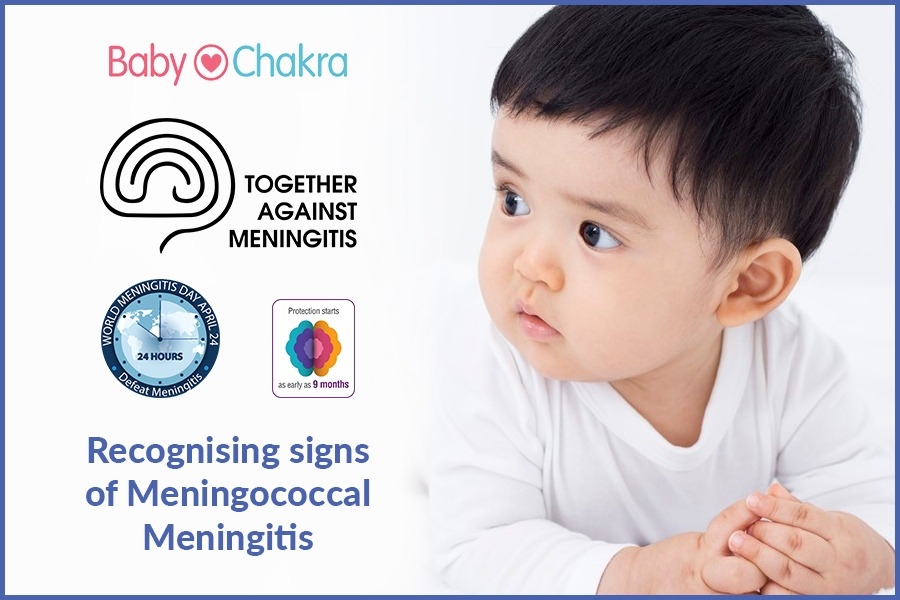
Understanding Meningitis: Know how to Keep Your Baby Safe From This Disease
21 Jul 2020 | 3 min Read
Babychakra
Author | 1369 Articles
As a new parent, it is challenging to understand what your baby might be feeling, since babies can only cry to express discomfort. The times when a baby cries or fusses more than usual, like during an illness, can be extremely unnerving for a parent. During such instances, it is important not to panic or overthink, but to just observe your baby’s symptoms and work on your paediatrician’s advice as soon as you can.
Some illnesses are not dangerous or life-threatening, but some others progress rapidly and might require urgent medical treatment. One of them is Meningococcal Meningitis.
Understanding Meningococcal Meningitis
Meningococcal meningitis is a disease caused by the bacteria named Neisseria meningitidis. In this disease, the bacteria infect the lining of the brain and the spinal cord. They can also cause the bloodstream to get infected.
The bacteria are transmitted from person to person through respiratory droplets or the secretions of the throat. The bacteria are present in the throat of the carrier from there, they can spread to the brain through the bloodstream.
When the carrier sneezes or coughs over someone or comes in close contact with an uninfected person, the disease spreads.
Risk Factors
It has been observed that infants, children and adolescents have the highest rate of Meningococcal Meningitis. To know more about vulnerable age groups, click here.
The disease can rapidly spread in areas where people gather and live in close proximity in large numbers. People with some pre-existing medical conditions such as HIV or Anatomic Asplenia are also at risk for contracting the disease.
Signs and Symptoms of Meningococcal Meningitis
Symptoms of Meningococcal Meningitis might be different in newborns and in children older than 2 years of age.

Reference for infographic: https://www.mayoclinic.org/diseases-conditions/meningitis/symptoms-causes/syc-20350508, Accessed 3rd July, 2020
Children above 2 years of age might exhibit the following symptoms:
- High fever
- Stiff neck
- Headache with nausea
- Confusion
- Light sensitivity
- Skin rash
- Loss of appetite or thirst
Preventing Meningococcal Meningitis
Since symptoms of Meningococcal Meningitis progress rapidly, immediate intervention is crucial. Diagnosing the disease on the basis of only irritability or high fever is not accurate, as fever is the body’s response to many illnesses.
The safest way to prevent this deadly disease is vaccination. Vaccinations against Meningococcal Meningitis have been available globally for more than 40 years.
Read more about the Meningococcal Meningitis vaccine here. It is wise to talk to your pediatrician about including this vaccine in your baby’s vaccination schedule to safely prevent the effects of this disease.
References:
1. https://ada.com/conditions/bacterial-meningitis, Accessed on April 22, 2020
2. https://www.cdc.gov/meningococcal , Accessed on April 22, 2020
3. https://www.who.int/news-room/fact-sheets/detail/meningococcal-meningitis, Accessed on April 22, 2020
4. https://www.cdc.gov/meningococcal/about/risk-age.html, Accessed on April 22, 2020
5. https://www.cdc.gov/meningococcal/about/risk-community.html, Accessed on April 22, 2020
6. https://www.cdc.gov/meningococcal/about/risk-medical.html, Accessed on April 22, 2020
7. https://ada.com/conditions/bacterial-meningitis/, Accessed on April 22, 2020
8.https://www.mayoclinic.org/diseases-conditions/meningitis/symptoms-causes/syc-20350508, Accessed on April 22, 2020
9. https://www.mayoclinic.org/diseases-conditions/fever/symptoms-causes/syc-20352759, Accessed on April 22, 2020
A


Related Topics for you
Suggestions offered by doctors on BabyChakra are of advisory nature i.e., for educational and informational purposes only. Content posted on, created for, or compiled by BabyChakra is not intended or designed to replace your doctor's independent judgment about any symptom, condition, or the appropriateness or risks of a procedure or treatment for a given person.
